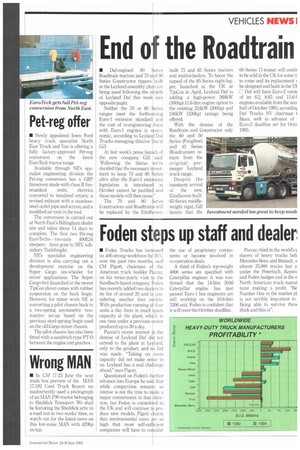End of the Roadtrain
Page 11

If you've noticed an error in this article please click here to report it so we can fix it.
• Daf-engined 80 Series Roadtrain tractors and 70 and 80 Series Constructor tippers built at the Leyland aSsembly plant are being axed following the rebirth of Leyland Daf this week (see opposite page).
Neither the 70 or 80 Series ranges meet the forthcoming Euro-1 emission standard and the cost of re-engineering them with Euro-1 engines is uneconomic, according to Leyland Dal Trucks managing director David Gill.
At last week's press launch of the new company Gill said: "Following the hiatus we've decided that the necessary investment to keep 70 and 80 Series alive after the Euro-1 emissions legislation is introduced in October (=not be justified and these models will then cease."
The 70 and 80 Series Constructors and Roadtrains will be replaced by the Eindlineen built 75 and 85 Series tractors and multiwheelers. To boost the appeal of the 85 Series eight-legger, launched in the UK at Tipeon in April, Leyland Daf is adding a high-power 269kW (360hp) 11.6-litre engine option to the existing 224kW (30011p) and 246kW (330hp) ratings being offered.
Despite the imminent arrival of the new. Eindhoven-built 65-Series middleweight rigid, Gill insists that the 60 Series 17-tonner will condi to be sold in the UK for some ti to come and its replacement ■ be designed and built in the UT
Daf will have Euro-2 versic of its 6.2, 8.65 and 11.6-1: engines available from the sect half of October 1993, accordim Daf Trucks NV chairman ( Baan, well in advance of Euro-2 deadline set for Oct°. 1995.
















































































